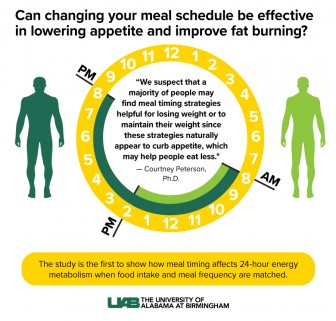UAB Study Shows Limiting Meal Times Can Lower Appetite
Researchers have known for a while that eating earlier in the day when metabolism rates are higher can help with weight loss. So can consuming all meals within a narrow window of time and then fasting for several hours.
“But there was a big question, like why does it help with weight loss?” Courtney Peterson, assistant professor in UAB’s Department of Nutrition Sciences, says. “Is it because it helps people burn more calories, or is it because it makes them less hungry, or both?”
To try to answer that question, Peterson and fellow researchers conducted a study to measure changes in appetite levels and the number of calories people burn when they use Early Time-Restricted Feeding (eTRF), a form of intermittent fasting.
Participants tried two different meal schedules. They spent four days eating from 8 a.m. to 8 p.m., the average schedule for an American adult, and they spent another four days eating the same meals between 8 a.m. and 2 p.m, a version of eTRF.
On the fourth day of each meal schedule, participants remained in a controlled environment for 24 hours so researchers could measure data including levels of the hunger hormone Ghrelin.

Peterson says the results were a bit surprising. They found that the eTRF schedule did not help participants burn more calories, but it did help them burn more fat and it lowered their appetite levels.
“That’s still a major victory,” Peterson says, “because if you can make people naturally less hungry, then that’s going to help them not only with weight loss, but with maintaining their weight.”
Researchers enrolled 11 overweight men and women, a small but appropriate sample size, according to Peterson. The study was published online Wednesday in the journal Obesity.
Peterson says the next step is to test whether people are able to consistently follow the restricted meal schedule and whether it can actually help people lose weight.
Photo by Pixabay
Editor’s Note: WBHM is a member-supported service of UAB, but our newsroom and business operations are separate.
Kate Hudson on regret, rom-coms and finding a role that hits all the notes
Hudson always wanted to sing, but feared it would derail her acting career. Now she's up for an Oscar for her portrayal of a hairdresser who performs in a Neil Diamond tribute band in Song Sung Blue.
A powerful winter storm is roiling travel across the northeastern U.S.
Forecasters called travel conditions "extremely treacherous" and "nearly impossible" in areas hit hardest by the storm, and air and train traffic is at a standstill in many parts of the region.
U.K. arrests ex-ambassador to the U.S. on suspicion of misconduct over Epstein ties
Police have arrested Peter Mandelson, a veteran Labour Party politician who served as British ambassador to the U.S., as part of an investigation into his ties with Jeffrey Epstein.
What NPR reporters will remember most about these Winter Olympics
NPR's reporters on the ground in Italy reflect on a far-flung, jam-packed Winter Olympics.
In the shadow of the Olympics, migrants search for a welcome in Milan
As Italy cracks down on migration, Milan takes a different path — offering shelter and integration to asylum seekers even as the central government tightens borders and funds deterrence abroad.
Trump to raise global tariffs. And, most say the state of the union is weak, poll says
President Trump says he is raising global tariffs to 15%. And ahead of the president's address tomorrow, most Americans say the state of the union is not strong, according to an NPR poll.






